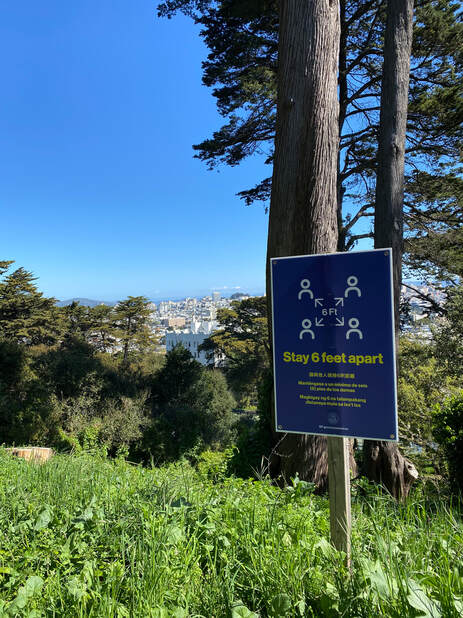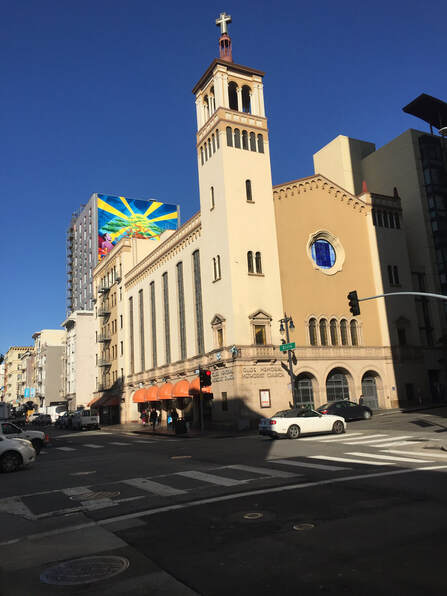|
I offer this story from the other 2020, right before sheltering and distancing and virtual connections. I don’t know about you, but I feel like I’ve lost one of my senses, the sense of touch, the connection that comes from being physically proximate. People who lose one of their senses often report that other senses get stronger. I hope so. But it has me thinking about compassion, from the Latin “to suffer with,” it’s a connection that includes intention and action. At a time of great restriction, we are also called to great action, Black lives need our voices and our feet, our broken country and world need our imagination, engagement and our votes. Yet, can this moment hold the possibility of a pause, connecting to the invisible energy that moves the heart and thereby moves and sustains our action? Compassion is this energy, a two-way flow that must include ourselves and others. Compassion in, for me. Compassion out, for you. “For someone to develop genuine compassion towards others, first he or she must have a basis upon which to cultivate compassion, and the basis is the ability to connect to one’s own feelings and to care for one’s own welfare. Caring for others requires caring for oneself.” The Dalai Lama Glide Church’s Freedom Hall is filled with folding tables with colorful tablecloths. A large screen is showing Glide’s Sunday celebration. The room is filled with congregants, many unhoused or struggling with basic necessities, who prefer the coffee, and the casual and warm feel of Freedom Hall to the sanctuary upstairs.
“Is there anyone I should talk to?” I ask Pam, one of the hosts for the Freedom Hall celebration. It’s mental health awareness Sunday. I’ve been asked to be available in case someone in the congregation needs to talk to a therapist. Yes, that’s as loaded as it sounds. Talking to a therapist is not like talking to a car mechanic. Mental health can’t be installed like a new carburetor. Yet, straddling my roles of a congregant and therapist, I’m committed to offer what support and comfort I can. Pam nods, “Oh yes, over there. She’s struggling.” She sits hunched over, perhaps in prayer? No, just bent over, as close to a fetal position as sitting will allow. A rolling suitcase sits by her feet. She is wearing sweats and a heavy coat. “Good morning, my name is David, how are you today?” I hear my voice and think that I sound like a Starbucks’ barista and I’m not sure I believe in what I am selling. She looks briefly at me with her bloodshot eyes and shakes her head. “Bad,” Her voice sounds like a rock that is sinking because it knows it can’t float. I inhale, “Can I sit?” She nods. I sit down and ask, “What’s your name?” Let’s call her Stella. “Stella, what’s going on?” The tears arrive before words, splashing over her eye lids, as if an overfilled pool is just waiting for my arrival. Eventually sobs subside. “My best friend died this week. They found him in his SRO." (single room occupancy) "He died alone.” She bends, more tears fall into her lap. I feel the familiar inadequacy of words and my privilege—housed, white, male. “I don’t want to live,” she adds. My mind begins to dart like a mouse chased by a cat. These are the words that can activate a therapist’s limbic system (the fear response of the brain to danger). There is a legal mandate for therapists around expressions of self-harm that requires an assessment and possible protective action and legal consequences if you get it wrong. It’s designed for safety, but the unintended consequence is that at a time when someone is desperate for compassion, a therapists’ nervous system hits the emergency warning system, removing access to resources like compassion, empathy, discernment and perspective. “I’m afraid I’m gonna use. My shelter is horrible. People are mean. My sister is sick. They tell me I should just stop crying.” The cascade of problems falls as freely as the tears. I begin to lean away. The most common reaction to fear is to leave (emotionally or physically). I notice my constricted breath and by some grace, pause. I take two slow breaths and put my hand on my own good heart and say to myself, David . . . sweetie, this is so hard. Then I silently remember my intention from my morning meditation, May I rest in love, and with my feet firmly planted on the floor, I counter my fear instinct and lean in. “Tell me about your best friend.” She looks surprised and then tells me story after story about a funny, generous, and flawed man whom she loved. For the moment, the storm passes over. Against all odds, Stella remembers she has agency—among the many obstacles and closed doors, she sees one that is open. She tells me that she is going to her recovery meeting later in the afternoon and that she’ll get through this. There is a palpable change of emotional temperature in the room. “I’m hungry.” She looks at me sideways. It’s not a statement, it’s a question. I notice that there is a Glide lunch bag sitting unopened on the table. “I see you got a bag lunch from the kitchen.” “I don’t like it.” I feel my heart clench and it begins to grow armor. Here comes the shake down. But again, by some unmerited grace, I pause. I’m going home to have lunch and I have choices—leftovers, or maybe a burrito or maybe Thai take out? What does she need—in this moment what does Stella need? My heart tenderizes and gets squishy. “Stella, what would you like for lunch?” “Turkey on sourdough with lots of mayonnaise she says with the confidence of someone who knows what she likes. She sits up in her chair for the first time. Her ability to choose brings something lighter—a smile. This time my eyes fill with tears as I run across the street to Happy Donuts. “Turkey on sourdough with lots of mayonnaise, please.”
2 Comments
Katrina
9/11/2020 07:37:45 am
What a wonderful story to remind us of the power of pause in our desire to help
Reply
Susan
9/12/2020 10:28:04 am
Thank you for this honest and very moving telling of your encounter with Stella. As a health care professional, I completely understand when you spoke of the "limbic system" kicking in when someone brings up SI; and that this response can result in a withdrawal of compassion just at the time when it needed most. Thank you for showing me how to move beyond that moment in time and opening up other possibilities. Blessing to you.
Reply
Leave a Reply. |
Daily Bites and BlessingsWelcome to "Daily Bites and Blessings." Pull up a chair. I’ve set a place for you at the table. These edibles are sometimes bitter, sometimes sweet and often they are both. This is a come as you are party. I invite you to bring your compassion, courage, and curiosity as we dine together on life's bounty. May our time together give us more light and more love.
Archives
January 2024
|



 RSS Feed
RSS Feed